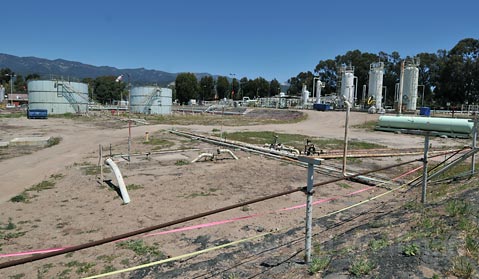State, Venoco Rumble Over Royalties
Energy Company Could Owe California $9.5 Million

California believes Venoco Inc. has been underpaying royalties owed to the state for more than a decade — to the tune of $9.5 million — while Venoco officials say they have overpaid $3 million in transactions all related to the oil company’s leases off Goleta’s shore.
The dispute — which took the form of a lawsuit against Venoco filed in Superior Court on November 16 — bubbled to the surface after the State Lands Commission started an audit in 2003 of the royalties that came from two oil and gas leases going back to 1997. The two sides don’t see eye-to-eye in three different, discrete computations: the market price of oil used to calculate royalties, what transportation costs Venoco can deduct, and what operating and capital investment costs can be deducted. “We have been working with the State Lands Commission for the past year in an attempt to resolve our differing interpretations of the royalty obligations contained in the oil and gas leases at South Ellwood,” said Michael Edwards, Venoco vice president of corporate and investor relations, in response to an inquiry about the litigation.
The state first entered into leases covering roughly 7,600 acres of offshore land, including a large portion of the South Ellwood Offshore Field, back in the 1960s. Venoco gained an interest in the leases in 1997, and in connection with those leases, it operates Platform Holly two miles offshore from Goleta.
The first dispute in the lawsuit is over the definition of “market price.” The lease requires Venoco — which reported a net income of $37 million in its 2011 third quarter — to pay the state a royalty on oil “removed or sold” from the leased land. That cost of oil would be the market rate, according to the lease, which was defined as “not … less than the highest price in the nearest field in the State of California at which oil of like gravity and quality is being sold in substantial quantities.”
The commission points to a Kern County oil field as the nearest one fitting the description of “like gravity and quality” in the lease, and claims that up to 2006 the Venoco price generally exceeded the price of the Kern County price, thus meeting the lease terms. But since 2006, according to the commission, Venoco has been selling oil for less than the price of the crude coming out of the comparable Kern County field.
Venoco contends the price at which it sells oil is the “market price,” though the commission says the company’s position is at odds with the language of the lease and that market price is not synonymous with sale price.
The two sides also dispute transportation costs. According to the suit, Venoco processes oil at the platform, and it is then transported to the onshore facility, where it is further processed for sale. It then makes its way into an onshore pipeline, traveling three miles to the Ellwood Marine Terminal, and from there is transported by barge to refineries either in the Los Angeles or San Francisco Bay area. Venoco contends it should be able to deduct transportation costs from the “well head to the point of sale,” according to the suit, while the state argues deducting the costs of transporting oil should halt at the Ellwood facility meter. This is where Venoco believes it has overpaid by $3 million. The state says Venoco must obtain commission approval before it can subtract the transportation costs beyond the onshore meter.
Finally, the commission claims Venoco is subtracting several costs and expenses — offshore waste disposal costs, employee drug testing, meals and travel expenses, among other things — that the lease does not allow. “Both the state and Venoco have concluded that the best way to resolve our differences is to have a court decide,” said Edwards, who couldn’t comment further on the litigation. “We look forward to the outcome.”



